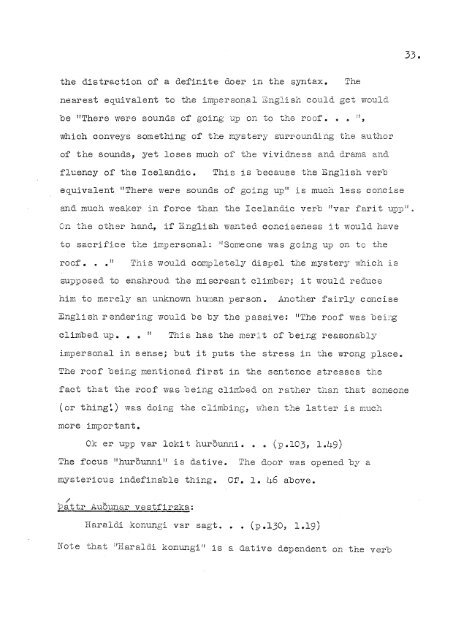The impersonal verb in Old Icelandic
The impersonal verb in Old Icelandic
The impersonal verb in Old Icelandic
You also want an ePaper? Increase the reach of your titles
YUMPU automatically turns print PDFs into web optimized ePapers that Google loves.
33.<br />
the distraction of a defi~ite doer <strong>in</strong> the syntax. <strong>The</strong><br />
nearest equivalent to the <strong>impersonal</strong> English could get would<br />
be II<strong>The</strong>re were sounds of go<strong>in</strong>g up on to the roof. • • 11,<br />
which conveys someth<strong>in</strong>g of the mystery surround<strong>in</strong>g the author<br />
of the sounds, yet loses much of the vividness and drmaa and<br />
fllJ.ency of the <strong>Icelandic</strong>.<br />
This is "because the English <strong>verb</strong><br />
equivalent II<strong>The</strong>re were sounds of go<strong>in</strong>g up!! is much less concise<br />
and much weaker <strong>in</strong> force than the <strong>Icelandic</strong> ver"b llvar fari t Upp".<br />
On the other hand, if English wanted conciseness it would have<br />
to sacrifj.ce the irr"personal: IISomeone was go<strong>in</strong>g up on to the<br />
roof. • • II<br />
This would completely dispel the m;yster;y which is<br />
supposed to ensl1.roud the mi screan t clim"ber; it would reduce<br />
him to ffierely an unknovm human person. Another fairly concise<br />
Engli sh render<strong>in</strong>g would be "by the passive: "<strong>The</strong> roof was beLg<br />
climbed up.. • • II This has the merit of be<strong>in</strong>g reasona"b1y<br />
<strong>impersonal</strong> <strong>in</strong> sense; but it puts the stress <strong>in</strong> the vvrong place ..<br />
<strong>The</strong> roof "be<strong>in</strong>g mentioned first <strong>in</strong> the sentence stresses the<br />
fact that the roof was be<strong>in</strong>g clirr:.bed on rather than that someone<br />
(or th<strong>in</strong>g~)<br />
was do<strong>in</strong>g the climb<strong>in</strong>g, vv-hen the latter is much<br />
more impor ta.Yl t.<br />
Ok er upp va~ lokit huroUlli~i ••• (p.103, 1.49)<br />
<strong>The</strong> focus "hurounnill is dative. <strong>The</strong> door was opened b~T<br />
a<br />
mysterious <strong>in</strong>def<strong>in</strong>able th<strong>in</strong>g. Of. 1. 46 above.<br />
/<br />
~attr<br />
AuoQYlar vestfirzka:<br />
Haraldi konungi val' sagt ••• (p.130, 1819)<br />
Note that ilHaraldi konungi 11<br />
is a dative dependent on the <strong>verb</strong>
















